
Are Artificial Sweeteners Bad For You? The Shocking Truth
Let’s take an objective scientific approach to answering the infamous question, are artificial sweeteners really bad for you?
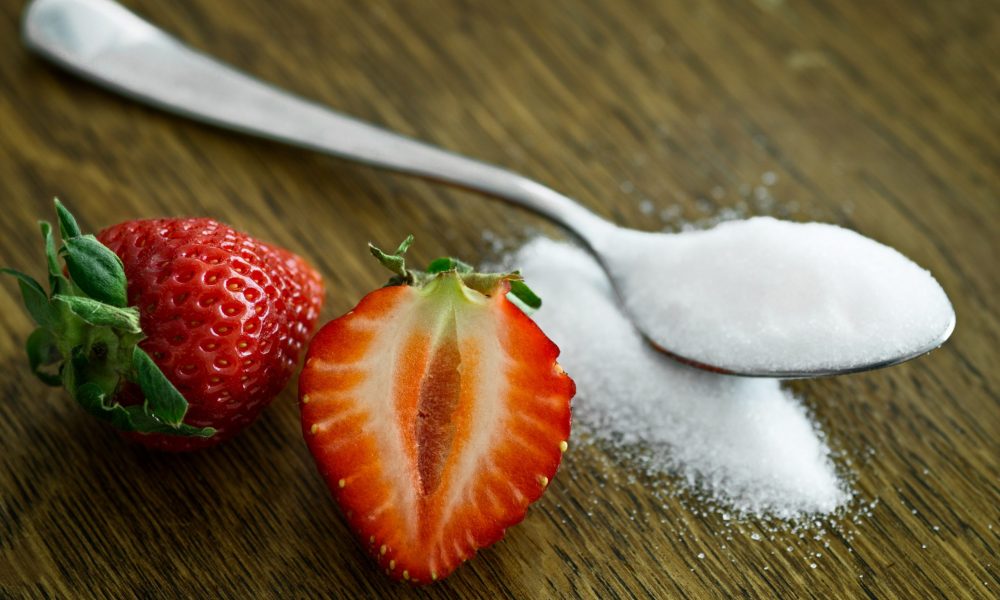
What if I told you everything you knew about sugar is wrong? Like not just a little wrong, but so wrong, you might even get a brain scan after realizing all the lies you believed about sugar.
You see, sugar garners a terrible reputation guilty of destroying our bodies and health, yet the blame has been so unwarranted.
Let me explain sugar to you in an honest manner, unlike all the exaggerated rumors you’ve seen on sensationalized headlines. Here are 7 common sugar myths you need to stop believing.
A simple sugar is either a monosaccharide (one sugar unit) or a disaccharide (2 sugar units). For example, glucose and fructose are each a monosaccharide, but together they can make table sugar (sucrose) which is now a disaccharide.
The other digestible carbohydrate is starch which is a polysaccharide (multiple simple sugars). These are often called complex carbs or slow carbs because they take time to break down into simpler forms.
And if you couldn’t already guess it, your body breaks down complex carbs into simple sugars, usually in the form of glucose (1). Simply put, all complex carbs will end up as simple sugar someway somehow. The distinction between simple and complex digestible carbs is simply to number the different sugar units. Quite arbitrary if you ask me.
Physiologically they still end up in the same form and affect your body the same way when the amount is matched.
Don’t believe me?
One study done in 398 subjects matched the calories and carbohydrates in 2 groups (2). One group had a high complex carb intake while the other group had a high simple carb intake (what people would consider a high sugar diet).
Body composition and blood lipids were the same between groups after 6 straight months. In other words, their weight, physique, and health were equal despite the drastic difference in complex vs simple carbohydrates.
Fructose is fruit sugar and it gets a particularly bad reputation due to it’s metabolic limitations. Fructose can only be broken down slowly in the liver and to a much smaller extent in muscle tissue (3). In other words, fructose is not as flexible of a simple sugar as glucose.
Overdosing on fructose can cause health issues, one of which being a conversion to fat that suffocates the liver (4,5). Sounds super scary, I know, but I promise you probably have nothing to worry about.
While fructose toxicity or a fatty liver is possible, it only occurs in a caloric surplus with extremely high fructose doses in unhealthy individuals (6). We have overwhelming evidence that not only is it deeply difficult to overdose on fructose, but calorie for calorie, fructose is not anymore fattening than other sugars (7,8,9,10).
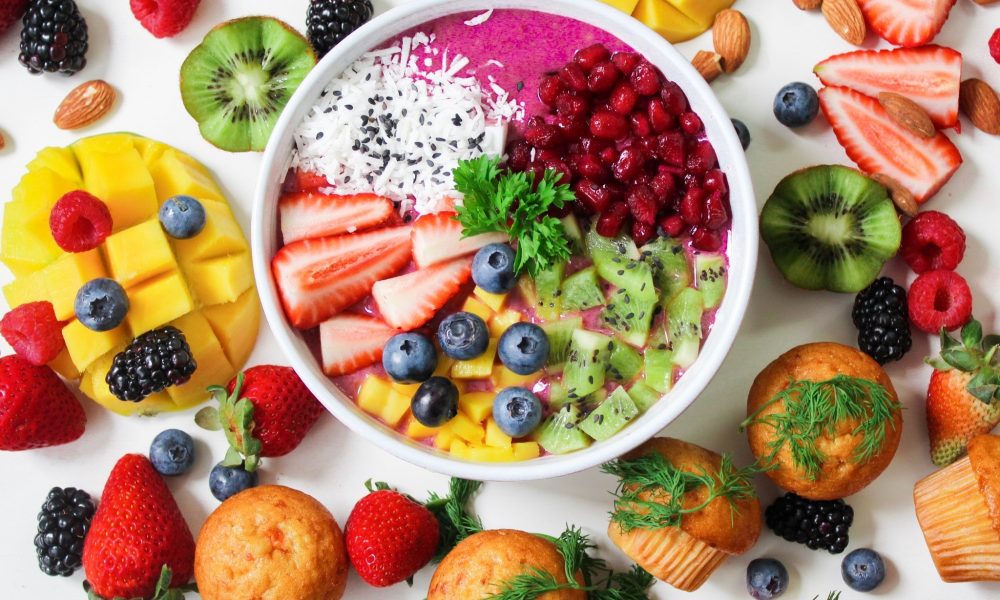
One tightly controlled study gave healthy men 150 grams of fructose daily for 8 weeks straight while keeping calories relatively stable found 0 health consequences (11). That’s the equivalent of about 20 bananas or 55 ounces of soda per day, but because calories were within reason, they didn’t get fat or unhealthy. In fact, subjects also ended up eating less of other sugars and slightly lost weight.
A review of fructose consumption found the only time human research shows the detrimental effects of fructose is in unrealistically high doses of processed forms (12). Unprocessed forms like fruits and vegetables have more fiber which slows sugar digestion preventing overdose.
Furthermore, most fructose sources whether processed or unprocessed also contain plenty of glucose which aids fructose absorption when together thus lowering the risk of fructose toxicity (13). One of the few slight exceptions is agave nectar/syrup which has an extreme fructose to glucose ratio (85:15), but even then, you’d have to chug bottles of agave by itself to reach toxicity (14).
On top of all this, exercising also protects against fructose toxicity (15,16).
Long story short, in practical settings, fructose is not a concern especially in whole foods like fruit. Avoiding fruits and vegetables because of fearing fructose will be infinitely worse for your health than including them.
Another reason fructose is vilified is it’s presence in high fructose corn syrup. However, as you just discovered, fructose isn’t inherently bad. Fortunately, neither is high fructose corn syrup.
In fact, despite it’s misleading name, high fructose corn syrup doesn’t even have that much fructose in it. It typically has no more than 42-55% fructose composition with the remaining percentage being glucose (17).
To put things into perspective, table sugar, the thing that most people say is so much better for you is a 50:50 ratio of fructose to glucose. If you’re too lazy to put two and two together, their ratios are pretty much the same (not that ratios even matter anyways).
In controlled studies, where calories are matched, table sugar and high fructose corn syrup have no difference in weight loss or health (18,19). A common example that deceives people are soda labels marketing as healthier when sweetened with cane sugar. In reality, it makes no difference whether sweetened with natural cane sugar or processed high fructose corn syrup.
Now that you learned high fructose corn syrup is essentially the same as table sugar, you’re wondering about how they stack up against other sugars?
The unsexy truth is that all sugar in of themselves are more similar than different. They all affect your body the same way and get broken down to the same simple forms (20). Some food sources like fruit are less calorically dense while being more nutritious/satiating making them better dietary choices (21), but the sugar itself isn’t metabolized meaningfully different than other types of sugar when the same amount is present.
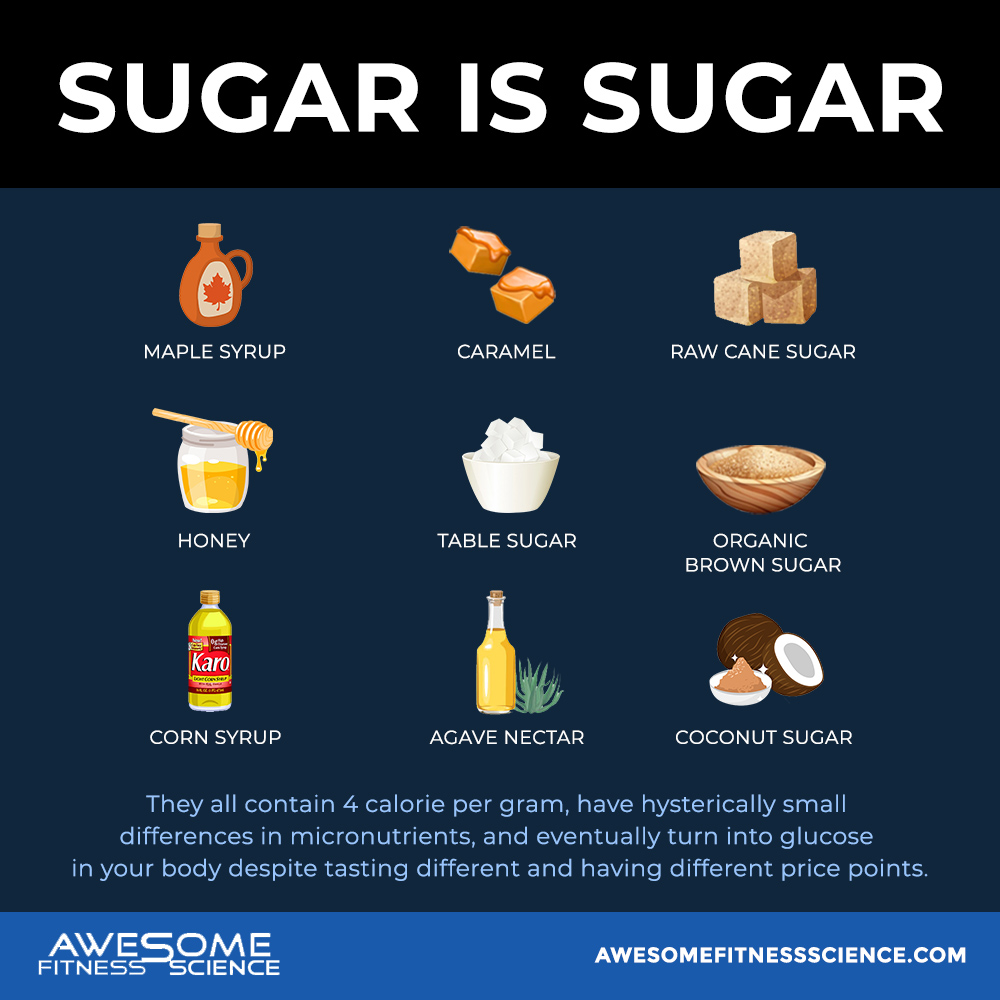
This concept is especially apparent when looking at sources of added sugar which have practically no micronutrients. Calorie for calorie, it doesn’t matter if you add honey, maple syrup, caramel, table sugar, raw sugar, brown sugar, coconut sugar, organic sugar, agave, or whatever fancy overpriced sugar from Whole Foods to your coffee.
They’re all sugar. They all contain 4 calorie per gram, have hysterically small differences in nutrients, and eventually turn into glucose in your body despite tasting different. This is not to say sugar as a whole is bad as I’ll discuss later, but just don’t think you’re on some healthy high horse for using an expensive trendy sugar over regular table sugar.
So we just learned different sugars are basically the same, but there’s this idea that sugar in general is fattening and that you can’t lose weight while eating sugar. This misconception leads people to cut all sugar from their diets in an attempt to lose weight. Fruit gets banned, their bland coffee is no longer sweetened, desserts are declined, and their life becomes utter misery all because they think sugar is fattening.
The truth is, sugar is not inherently fattening. Fat gain only happens when you eat more calories than you burn over time (aka a caloric surplus) regardless if those calories are sugar, starch, fat, or protein. Conversely, fat loss occurs when you eat less calories than you burn over time (aka a caloric deficit) regardless if those calories are sugar, starch, fat, or protein (22).
These are the undeniable laws of thermodynamics that humans are bound to. On one hand, it sucks to hear that as long as you’re a finite human not living in the magical world of Harry Potter, any calorie source can make you fat if over-consumed. However, it’s relieving to know that if you monitor calories correctly, sugar can be included in your diet without fat gain.
Let’s look at some studies because the proof is most definitely in the pudding (pun intended).
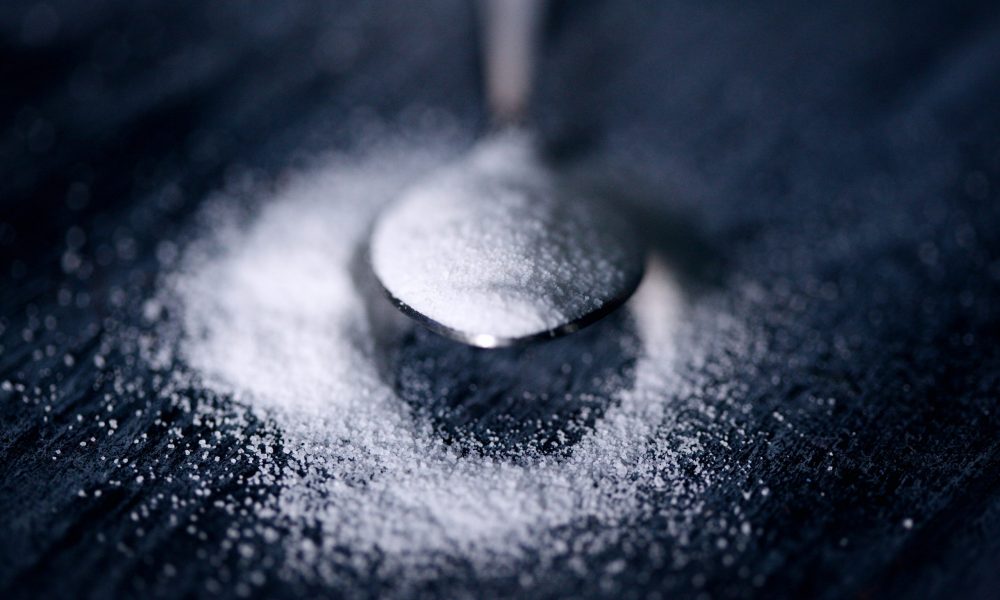
One study had 2 groups of people on a calorie equated diet, except one group had 8 and half times the sugar intake (23).
Can you guess what happened?
Both groups not only lost weight, but they lost the same amount.
Another study with 95 people were put on a calorie equated diet, except one group had 5% of calories coming from sugar while the other group had 10% of their calories from sugar (24). Both groups ended up with the same body composition despite one group eating double the sugar for 8 weeks. Surprisingly, the high sugar group even had a more favorable effect size.
Finally, another study put 2 groups into a calorie and macro matched diet (25). The low sugar group had 4% of their energy intake as sugar while a high sugar group had a whopping 43% of their energy intake as sugar. The high sugar group had almost half their calories come from sugar and was consuming a dose of almost 11 times the low sugar group for 6 weeks.
Regardless of the sugar consumption differences, their weight loss and health were the same.
Ultimately, sugar is not inherently fattening. It just seems that way because sugar in processed forms is highly energy dense, meaning for very little volume/satiety, they provide a lot of calories.
Soda or sugary beverages for example, don’t fill you up, but for every ounce you drink you’re exponentially adding more calories to your total intake compared to just drinking water without even realizing it.
So while you technically can eat processed sugary foods and still lose fat, it doesn’t mean it’s practical for optimal satiety.
People fear for their lives that sugar will give them diabetes and other nasty diseases, but this isn’t true. For example, people think sugar is highly glycemic, but sugar’s glycemic effect is moderate at best and even lower when compared to some complex carbs (26,27).
Furthermore, research shows no difference between a diet’s glycemic index on any health marker when macros are matched (28,29,30). Sugar also doesn’t alter your mood or cause brain fog (40).
The reason sugar seems so bad is because sugar can be energy dense as discussed earlier. If you’re not careful, heavily processed sugary foods and added sugar will skyrocket your calories into an unintentional caloric surplus while adding minimal nutritional value for years. You’ll eventually get fatter which makes you more insulin resistant, unable to tolerate glucose, and increases your risk of all the nasty diseases doctors warn you about. This is why some sugar sources have overconsumption risks, but sugar itself is not inherently bad.
If you don’t get fat, sugar has no link to poor health because sugar is not molecularly unhealthy (31,32). It can be included in a calorically reasonable diet for healthy individuals or in a calorically restricted diet for overweight individuals.
Whole fruit in particular is a sugar dense food source, but is highly filling, nutritious, healthy, and deeply beneficial for fat loss (33). You’d be a fool to avoid fruit if I didn’t already make that clear enough.
You’ll have sugar conspiracy theorist quote low quality rat research showing cocaine and sugar increases dopamine, but this doesn’t mean sugar is addicting like cocaine (34). Anything that makes you feel good will spike dopamine like seeing puppies, hugging people, passing a test, or exercising.
Current high-level research in humans shows sugar addiction simply doesn’t exist (35).

The reason it seems like sugar is addicting is because of hyper palatable foods. This is a fancy term describing common junk food that is constructed to taste extremely good usually consisting of fat, sugar, starch, and salt. A recent review found these foods are easily overeaten, but sugar is not inherently addicting (36).
Moreover, hyper palatable foods may have addictive properties, but even then, they don’t come close to resembling a truly addictive substance in behavior or neurobiology, not even in overweight/obese individuals (37).
Think about it, if sugar was addicting, you’d be craving lines of pure table sugar non-stop. Fruit is also almost pure sugar, but nobody ever goes, “Oh crap, I just can’t stop eating watermelon. Somebody sign me up for watermelon’s anonymous!”
The level of withdrawal symptoms you experience from not eating sugar is nowhere near the level of an actual drug addiction withdrawal. In fact, added sugar doesn’t even increase your appetite in the following meal (38).
To call sugar an addiction is downright hilarious. Sure, some of our favorite foods might be really fun to eat and make us want more than we should have, but these foods are a combination of various components, many of which are of higher doses than sugar, yet for whatever reason the world blames it all on sugar.
Here are more facts people don’t realize simply cause sugar is overly demonized in mainstream media.
This is not to say fat is addicting either, but sugar is most definitely not addicting. Keep all this in mind the next time you think of comparing sugar to cocaine. Your above average infatuation for chocolate will never match a true addiction.
So as you can see, sugar is not inherently evil as you previously thought. I’m not saying it’s a superfood, but on it’s own, it’s just a neutral empty calorie. Unfortunately, that truth isn’t polarizing enough to put on headlines, so mainstream media will continue to grab attention by saying sugar will give you cancer and kill your family.
Oh well, at least you who’s currently reading this know the sweet truth.
Ultimately, for most people, it’s fine to include sugar in your diet especially in whole food sources. The type of sugar largely doesn’t matter and the ideal dose will always be context dependent.
Sign up for AwesomeFitnessScience Weekly. You’ll get juicy insider secrets, updates, and stories.

Let’s take an objective scientific approach to answering the infamous question, are artificial sweeteners really bad for you?

Have you heard of reverse dieting? If you haven’t, don’t look it up because there’s an endless stream of YouTube videos and articles regurgitating this nonsense.
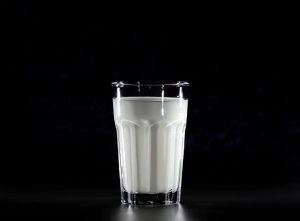
Dairy – A Healthy Choice That Idiots Don’t Realize Dairy is extremely misunderstood and often picked on by the vegan and paleo communities. Many people